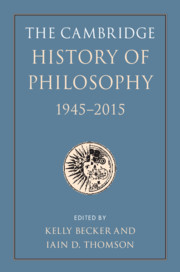Book contents
- The Cambridge History of Philosophy, 1945–2015
- The Cambridge History of Philosophy, 1945–2015
- Copyright page
- Contents
- Contributors
- Preface and Acknowledgments
- Introduction
- Part I Analytic Philosophy
- Part II Continental Philosophy
- Part III Bridge Builders, Border Crossers, Synthesizers, and Comparative Philosophy
- Section Eight Bridge Builders, Border Crossers, Synthesizers
- Section Nine Comparative Philosophy
- 49 Authenticity and the Right to Philosophy
- 50 The East in the West
- 51 Jewish Philosophy and the Shoah
- Part IV Epilogue: On the Philosophy of the History of Philosophy
- References
- Index
50 - The East in the West
Chinese, Japanese, and Indian Philosophy in the Twentieth Century
from Section Nine - Comparative Philosophy
Published online by Cambridge University Press: 08 November 2019
- The Cambridge History of Philosophy, 1945–2015
- The Cambridge History of Philosophy, 1945–2015
- Copyright page
- Contents
- Contributors
- Preface and Acknowledgments
- Introduction
- Part I Analytic Philosophy
- Part II Continental Philosophy
- Part III Bridge Builders, Border Crossers, Synthesizers, and Comparative Philosophy
- Section Eight Bridge Builders, Border Crossers, Synthesizers
- Section Nine Comparative Philosophy
- 49 Authenticity and the Right to Philosophy
- 50 The East in the West
- 51 Jewish Philosophy and the Shoah
- Part IV Epilogue: On the Philosophy of the History of Philosophy
- References
- Index
Summary
The task of this chapter is to consider the impact of Asian philosophies on the English-speaking philosophical world from 1945 to 2015. While this time period has been profoundly productive of philosophical engagements across cultural boundaries, it is important to begin by noting that the history of philosophy is itself a history of ideas, texts, and thinkers crossing linguistic and geographical borders. Only relatively recently have European and American philosophers considered philosophy to be a distinctly “Western” pursuit. In the beginning of modern European engagement with Asia in the sixteenth century, for instance, many Europeans counted Asian traditions and civilizations as partners in – even the originators of – philosophical inquiry. Since the reconstruction of the “philosophical canon” in the eighteenth century, however, the discipline has been largely Eurocentric, and this has resulted in dramatic inequities in the terms of engagement with Asian philosophical traditions (Park 2013). Much early comparative work, in fact, often treats Western traditions as the gold standard, frequently doing violence to non-Western traditions in forcing them to try to conform to artificial, external standards (Kirloskar-Steinbach, Ramana, and Maffie 2014.)
- Type
- Chapter
- Information
- The Cambridge History of Philosophy, 1945–2015 , pp. 692 - 708Publisher: Cambridge University PressPrint publication year: 2019



